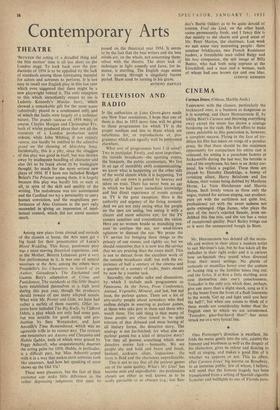TELEVISION AND RADIO
IF the authorities at Lime Grove shave made any New Year resolutions, I hope that one of them is that in 1955 more time will be given to those programmes for which TV is the proper medium and less to those which are substitutes for, or reproductions of. pro- grammes which can cgually well be performed elsewhere. What sort of programmes have 1 in mind? Two in particular. Firstly, and most important, the outside broadcasts—the sporting events, the banquets, the public ceremonials. We live in an age of incredibly swift communication: we know what is happening on the other side of the world almost while it is happening. Yet nearly all our news is gained by hearsay and taken on trust. There has never been an age in which we had more immediate knowledge and less direct experience of events around us. TV is the great exception. Here is the authority and urgency of the living moment. And we are not only seeing what the people on the spot are seeing, but seeing it with a clearer and more selective eye; for the TV camera canalises and concentrates the vision. Here are no women beside us munching pea- nuts to confuse the ear, nor wind-blown agitators to distract the eye. We praise the TV service for bringing these things to the privacy of our rooms, and rightly so; but we should remember, that it is now less the service that we are praising than the event itself, This is not to detract from the excellent work of the outside broadcasts staff; but with the ex- perience of half a century of the cinema and a quarter of a century of radio, theirs should by now be a routine task.
Secondly, the studio talks and discussions,
by which I include such programmes as Panorama, In the News, Press Conference,
Animal, Vegetable, Mineral, and last, but not
least, the parlour games. There are a lot of arty-crafty people about nowadays who find endless delight in sneering at parlour games,
at those who take part in them and those who watch them. The odd thing is that many of
these people are often found to be quite
tolerant of that debased and most boring of all literary forms, the detective story. The analogy is not far-fetched; for what, else are
parlour games but a kind of detective story? Yet they all possess something which most
detective stories lack — humanity. We see people shy and bold and brave and brash, hesitant, cocksure, silent, loquacious: the form is fluid and the characters unpredictable.
This is not to say that all the parlour games are of the same quality. What's My Line? has become stale and unprofitable: the professions chosen are either so well known as to be easily guessahlc or so obscure (e.g., last Sun- day's Beetle Odder) as to be quite devoid of interest. Find the Link, on the other hand, seems permanently fresh; and I fancy this is due mainly to the charm and good sense of Mr. Peter Martyn, the chairman. Last week we met some very interesting people: three amateur bricklayers, two French Resistance leaders, a formidable man called Bulgy and his boy companion, the spit image of Billy Bunter, who had both sung soprano at the Eisteddfod, and a man and a woman, each of whom had one brown eye and one blue.
LUDOV4C KENNEDY














































 Previous page
Previous page